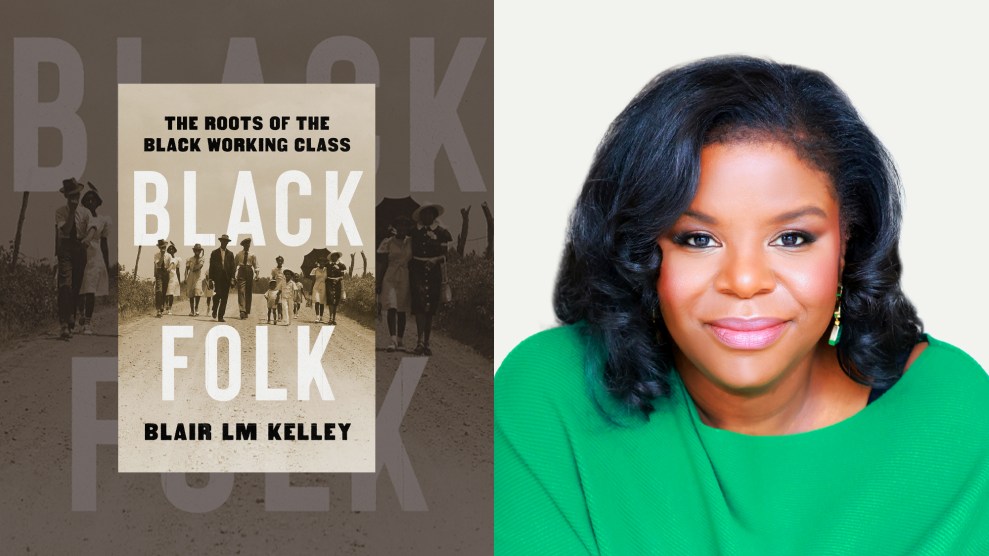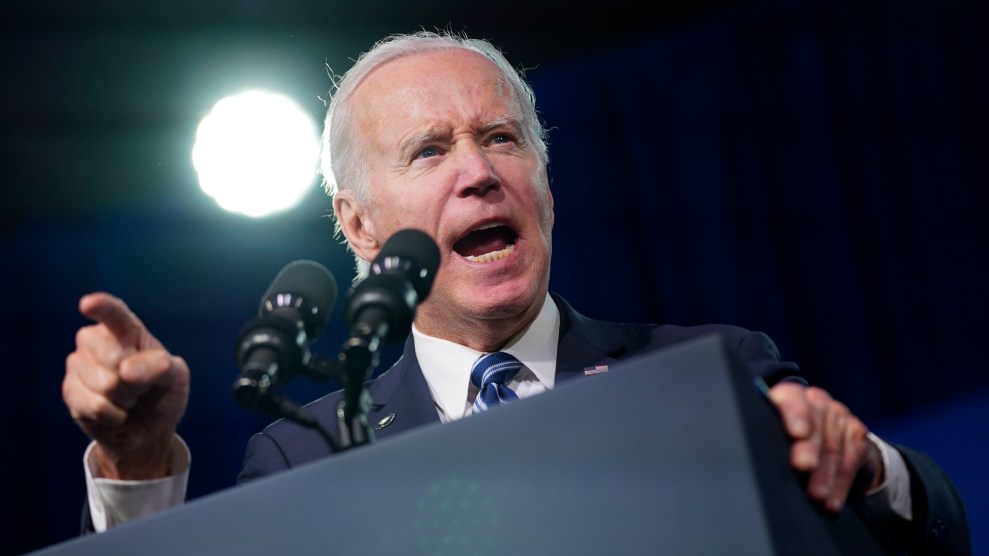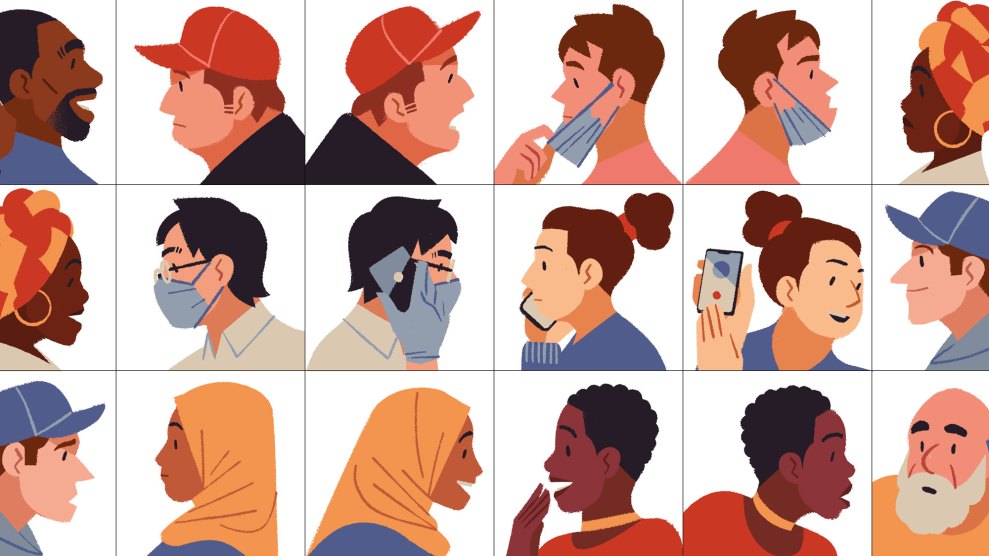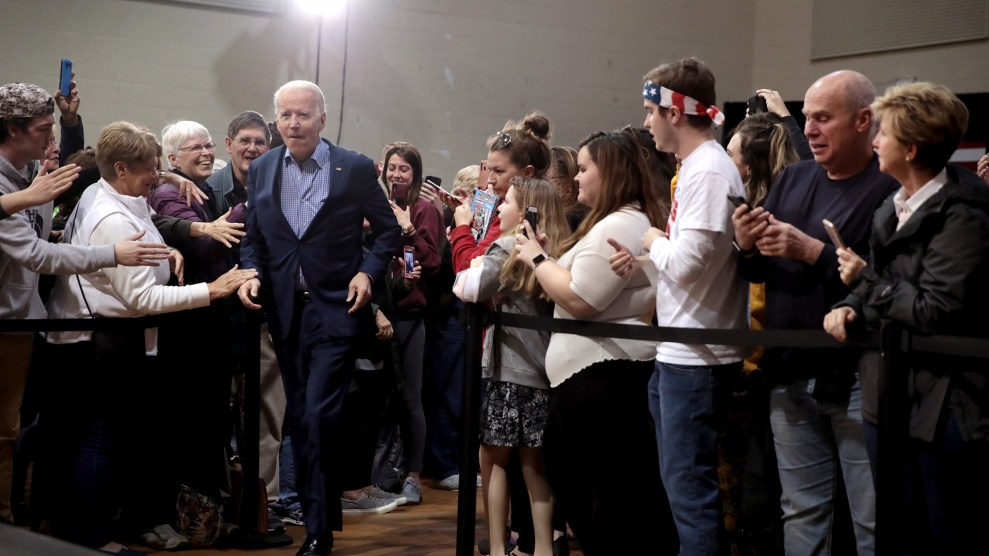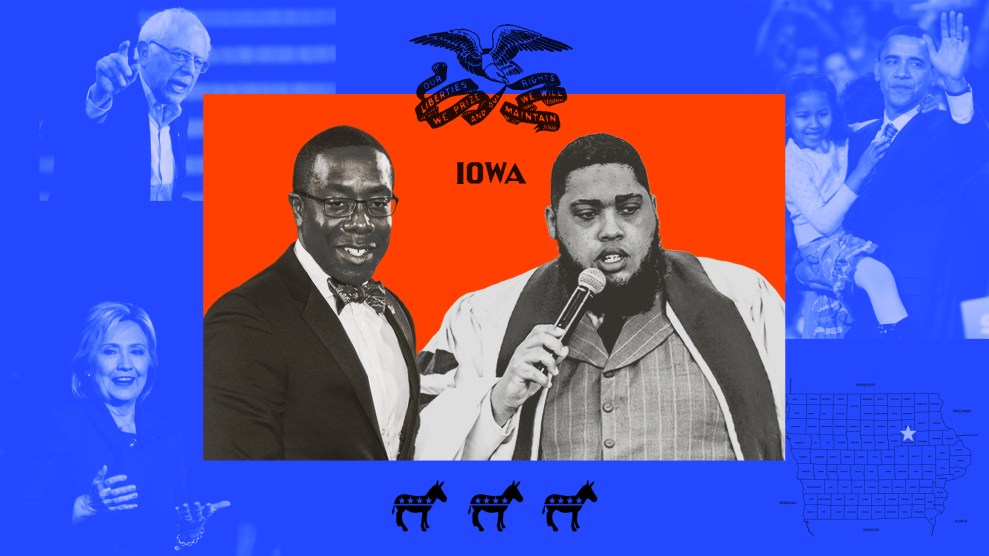
Mayor Quentin Hart, left, and Pastor Frantz WhitfieldMother Jones illustration: Getty (2); ZUMA (3)
Set along the Cedar River a two hour drive north of Des Moines lies the small city of Waterloo—Iowa’s Blackest town. The river sharply divides its East and West sides, with a quaint city center astride its banks. For several decades, the headliners at the city’s downtown performing arts center’s open-air amphitheater, its high school gyms, and its church pulpits have included national politicians seeking the White House.
That’s not uncommon for Iowa, whose caucuses have helped pick presidents of both parties since 1972. But what distinguishes Waterloo from most other cities and towns in the overwhelmingly white state is its striking diversity, with a sizable community of Black voters who have historically been highly sought after by Democratic campaigns.
“It’s not a large population in other areas” of the state, says Mayor Quentin Hart, and so candidates have worked hard “to try to earn the Black vote here.” In 2019, after months of courting by numerous campaigns, Hart endorsed Pete Buttigeig shortly before the 2020 caucuses—giving him late breaking coverage in both state and national outlets that played against the storyline that he struggled to gain the support of Black voters.
Pastor Frantz Whitfield hosted presidential candidates going as far back as Jesse Jackson and Bill Clinton for services at Mt. Carmel Baptist Church. During caucuses, candidates called from their cell phones, requesting speaking time during services. “We had Beto O’Rourke with us one Sunday morning, and as soon as he walked out, Mayor Bill deBlasio from New York was walking in,” he says, recalling a day ahead of the 2020 Democratic caucus. In the end, that year Whitfield endorsed then-candidate Joe Biden, who came in fourth place in a contest marred by technical failures.
Biden’s campaign was revived three weeks later when he easily carried South Carolina, with its predominantly Black democratic primary electorate. And under Biden’s watch, the Democratic Party, citing an interest in uplifting voters in more diverse states, has moved to abandon the Iowa caucus. This year, its presidential nomination contest is officially set to start on February 3rd in South Carolina.
Whitfield and other leaders from Waterloo’s Black, blue-collar kingmaking community don’t relish that Iowa was dethroned. But while they may no longer be so valued by campaigns, their years in the maelstrom have left them with advice to offer. Some applies to those hoping to engage Black voters elsewhere, including Biden this November, and future Democrats in 2028’s open primary. But much of what they’ve learned—about the value of coordinated advocacy and pushing for local campaign hiring and spending—offers broader lessons to Black communities elsewhere on how to step into their own power when politicians seek votes.
Even if Waterloo’s influence has sunset, Whitfield still receives numerous invitations to Washington from the administration. At the 2022 White House Christmas party, he met a pastor who came from South Carolina who said, “‘Well, looks like we’re swapping spots this election cycle,’” Whitfield recounts. “I said, ‘Take full advantage of it. Take full advantage of it.’”
Waterloo has industrial roots, and the history of its Black community lies in the laborers who were brought in by train, many from the Deep South, in the midst of a 1910 strike by white workers. Today, Black residents make up roughly 17 percent of Waterloo’s 67,000 residents—a significant share in a state where African Americans constitute less than 4 percent of the overall population.
While the city is cherished by those who call it home, it can be a hard place: a 2018 report ranked Waterloo as the worst place for Black people to live in the United States, citing employment and housing discrimination. The city remains largely segregated, with the Black community rooted east of the Cedar, where the Southern strikebreakers made their homes generations ago. Democratic presidential candidates passing through would sometimes hold one event in East Waterloo and another in West Waterloo on the same day, given the sharp divide.
Iowa’s leaders at all levels are acutely aware of the caucuses’ role as a significant money maker; the Des Moines-Ames area alone received upwards of $100 million in television ads in 2020. Advocates in Waterloo are no exception, and Deidre DeJear, who in 2022 became the first African American nominated by Iowa Democrats for governor, says where and how the campaign opens its wallet matters.
“They get an opportunity to hire community members that are in those communities. They get an opportunity to invest dollars, whether it be having office space…the local radio and the local television station that we know those community members are listening to and watching,” she explains.
The Democrats’ standard Iowa caucus playbook involved parachuting in hordes of twenty-something organizers from big cities and college towns outside the Hawkeye State. I was one of them in Waterloo ahead of the 2020 primaries, working for Kamala Harris. Residents could spot campaign interlopers like me by how we pronounced the city’s name: like the ABBA song, with a downward trail; Locals emphasize the closing “–loo” at the end, raising their tone as they call home. Waterloo.
During the caucuses’ reign, East Waterloo—Black Waterloo—got its share of surface-level drop-by visits. “They’ll do a sweep visually, where press is engaged,” says DeJear. Over time, Waterloo’s Black leaders pressed, with some success, for deeper investment and engagement, including by demanding that campaign jobs instead go to people from Waterloo. “What happened to the young people in our community that are able to knock doors, able to work on these campaigns, and be paid to do it?” asks Mayor Hart.
Ryan Stevenson, an East Waterloo native, says he “didn’t grow up seeing yard signs” or “getting literature and mailers.” But he was hired at 31 to organize for Cory Booker ahead of the 2020 caucuses. He credits his bosses with allowing him “to be creative in that position, and not just do typical organizing stuff,” he says, as he built relationships volunteering at the food bank, or at the House of Hope, a transitional housing center. “We were there,” he says, “organizing people to move on issues. I [wanted to build] something that would move my community forward.”
“My family lives in the same neighborhood we’ve always lived in. On my grandmother’s block, everybody has lived there for like 50 years. So, if I’m working for a candidate, I can pull up, take a yard sign, and put it in every yard up and down the street. Just because [my neighbors] support me and are with me,” Stevenson says.
Stevenson’s hiring created a career pathway for him, a local Black resident, to work in politics—an opportunity campaigns often extend to college students or interns able to afford no or low pay. It also left a foundation for local Black political empowerment that outlasted the presidential election.
“We all know how campaigns are, right? They build up these massive programs and systems, and then once the election is over, it’s over,” Stevenson says. “I wanted to be there and build. It eventually set me up to do other things within the community.” He went on to lead a grassroots movement rooted in East Waterloo that successfully pushed police to drop a logo resembling a KKK symbol. Soon after, he’d manage a 2021 campaign for city council for Nia Wilder, a former host on KBBG, Waterloo’s Black radio station. Her victory helped to secure the first majority-Black council in Waterloo history—all within a year of Stevenson’s stint with Booker.
Democratic campaigns are often criticized for shallow encounters and pandering missteps with Black voters: a photo opp at the local soul food joint, or a pit stop at a Black church. The deeper investments eventually gained in Waterloo, including hirings like Stevenson’s, weren’t offered easily. They came from community leaders working with one another to challenge campaigns to do better.
“You have a lot of people that come into your community,” says Mayor Hart, “and then the question is, after they come into the community to earn your support, how do you maximize that relationship?” For places that find themselves courted like Waterloo once was, he recommends launching a “coordinated conversation [among leaders] about what matters most and what creates real community change” before the candidates come. “These folks can’t offer the world, but [you] need to find somebody that’s willing to listen,” he says.
Councilmember Wilder agrees: “Before anything happens with anyone coming into your city wanting to do anything, meet as a community first, so that you can understand where you all align.”
Latanya Graves, president of the Black Hawk County NAACP says that without local leaders flexing their muscles, the campaign process can be formulaic. “They come in with a laundry list and say, ‘Well, I’m going to do this, and I’m going to change that, and I’ve already drafted my plans to put this in place.’ And people are looking at them, like ‘Well what about my issues?’ A lot of times, our issues fall by the wayside.”
Waterloo’s black leaders think such coordination could have gotten their community more if it had started earlier. But in addition to some success securing local job opportunities, they say their efforts did help elevate their city’s profile; in 2019, Waterloo hosted a presidential forum on local and urban issues sponsored by the US Conference of Mayors.
With some 2024 polling revealing shrinking enthusiasm for President Biden’s reelection among Black voters, Waterloo’s recent history offers a clear warning of the risks of a prominent white Democrat neglecting outreach to Black voters. In the Democrats’ 2016 presidential primary contest, Pastor Whitfield was an early endorser of Secretary of State Hillary Clinton. But as caucus season continued and Bernie Sanders picked up steam, he and other Black community leaders approached the Clinton campaign to urge deeper engagement in Waterloo. When they saw no change, Whitfield switched his endorsement.
Clinton’s team thought they had it “in the bag, that they were already going to win Waterloo and Black Hawk County,” Whitfield recounts. “They felt like they really didn’t need to connect with any of the leaders here. They didn’t take [our] advice.” Come caucus night, Bernie Sanders carried the area.
The story had been entirely different in 2007, when candidate Barack Obama held a rally in Waterloo on the very same February day that he announced his presidential candidacy, not so far away in Springfield, Illinois. On caucus night, the county gave him almost as much support as Hillary Clinton and John Edwards, the two runners-up, combined. In a return 2012 visit, he flattered a crowd of 2,000 attendees, telling them “it was in your backyards where our movement for change began.”
“It shows our value, having that [campaign visit] the same day that he launched in his home state,” says Mayor Hart. While national media narratives focused on the extent Obama’s Iowa 2008 victory showed he could win over white voters, on caucus night, most ignored its roots in Waterloo, and the Black voters who buoyed him there—and whose strong support would go on to deliver him the nomination and White House. “Our support is important—whether candidates appreciate it, or believe it, or not,” says Graves.
As the Democrats’ primary calendar moves to new territory, Black voters in South Carolina and the candidates seeking their support have a chance to demonstrate an authentic and constructive commitment to building the party’s Black voter base in a way that lasts beyond election day. As primary schedules change, Waterloo knows that politicians come and go. For the Black communities they visit, Stevenson has a reminder: “At the end of the day, this is gonna be y’all home.”
Top image: Mother Jones illustration; Alex Wong/Getty; Win McNamee/Getty; Paul Boucher/ZUMA; Jack Kurtz/ZUMA; Al Drago/CQ Roll Call/ZUMA
